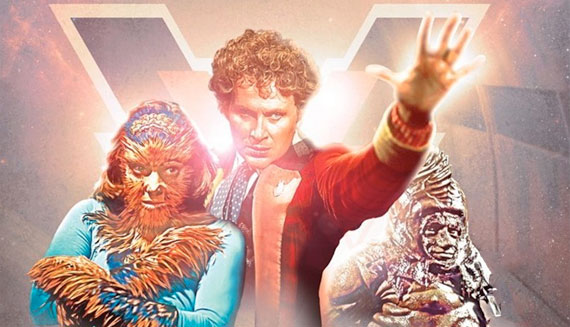Defining the Doctor: Vengeance on Varos
Patrick Kavanagh-Sproull continues his series looking at one key story from each Doctor, this time with Colin Baker.

Doctor Who has always had episodes with darker motifs, varying from the environmentally-conscience Third Doctor yarn, The Green Death to the more recent abhorred Love & Monsters. Each of these stories have dour and tragic underlying themes, different ones, naturally (in TGD, it’s the fear of humankind destroying the environment (the outcome being humungous sickening maggots) and in L&M it’s the after-effects the Doctor has on people and places). Vengeance on Varos from the Sixth Doctor’s abrupt tenure is a prime example of when Doctor Who gets bleak… really bleak. Think Suzanne Collins’ The Hunger Games plus a shoddy BBC budget, and of course, the obligatory alien planet.
The concept of live killings as entertainment dates back the Roman era where a fighter would engage in a gladiatorial game against a compatriot and they would battle to the death. Suzanne Collins uses a similar idea in her blockbuster book series, The Hunger Games and that has brought the idea of televised murder into the modern day but in Doctor Who there is Vengeance on Varos.
The Doctor and Peri materialize on Varos, a planet with an abusive and inconsiderate government, in search of Zeiton-7 – a rare fuel source for the TARDIS (which had conveniently never been mentioned prior to Vengeance on Varos) – to discover that Varos’ leaders are supporting executions on its screens. Naturally the Doctor is outraged but rather than immediately set out to stop it, he inadvertently brings the cruel system down.
The Sixth Doctor was the darkest in my view and he was less of the pacifistic and dovelike Time Lord that we had gotten used to, striving to stop conflict without using violence. The fact that the Doctor didn’t attempt to end Varos’ brutal regime straightaway shows that he is a very different man (although he does eventually stop the barbaric goings-on). One scene that shows just how unalike the Sixth Doctor is to his other bodies is when he disturbs the two guards in the acid bath who promptly fall in, one dragging down another. The Doctor leaves with a sardonic wisecrack, unperturbed at their deaths. Almost every other Doctor would have shown compassion and pity but the Sixth Doctor didn’t express anything of the sort. Colin Baker’s incarnation was so contrasting to the other Doctors that he is hated and loved for being so different in this way.
Nicola Bryant’s Peri is a really overlooked companion (but not when it comes to her outfits in Planet of Fire) and I found myself really engaging with the ‘American’. With a lamentable accent young Peri stumbles around the Varos complex, after being split up from the Doctor in a rather perfunctory manner. The one thing that I really like about Peri is that she’s a very independent woman and rarely succumbs to the banal damsel in distress trope. Unfortunately in Vengeance on Varos she slips into ‘shriek, panic, get hysterical, panic again, shriek a little more’ far too often and is at one point strapped to a table (to have her cells transmuted, admittedly). Vengeance isn’t Peri’s best outing but it’s most definitely the Sixth Doctor’s.

Colin Baker is an absolutely fantastic actor; he can convey almost all emotions portraying the Doctor and thus his incarnation is incredibly multifaceted changing moods quicker than Prisoner Zero alters his form. His version of the reputable Time Lord is one of my favourite down to the sheer diversity of his character – the same variety is found within the stories attired to him.
Vengeance on Varos isn’t perfect; a lot of it appears to me as a whole load of wandering around punctuated by violent encounters and a lot of the characters seem underused and not fully developed (the reptilian Sil spends an awful lot of time cackling gleefully and having childish tantrums without rising to much) but it’s the Sixth Doctor’s best story in characterisation and depiction of his zany and changeable world.








